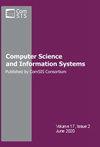Applying spin checker on 5G EAP-TLS authentication protocol analysis
IF 1.2
4区 计算机科学
Q4 COMPUTER SCIENCE, INFORMATION SYSTEMS
引用次数: 0
Abstract
Currently, there is relatively little formal analysis and verification work on the 5G EAP-TLS authentication protocol. In this paper, we use the model checker SPIN to perform a formal analysis of the 5G EAP-TLS authentication protocol. Firstly, we analyze the process of the 5G EAP-TLS authentication protocol and abstract it to obtain a formal model of the protocol. Then, we describe the construction of the protocol model based on the Promela language. The unique feature of this paper is the replacement of the hash value of the 5G EAP-TLS authentication protocol with the message content field encrypted by an unknown subject public key. This is because the Promela language in SPIN has an eval function that can check the value of each field. This can replace the function of the hash function and make the Promela model construction more portable. The paper analyzes the attack paths of the protocol and reveals design flaws that undermine the expected identity authentication attributes and secret consistency of the protocol. The results not only provide a comprehensive understanding of the security properties of the 5G EAP-TLS authentication protocol but also offer valuable insights and guidance for the verification of the protocol's security properties, security design, and optimization of protocol implementation and interoperability.旋转检查器在5G EAP-TLS认证协议分析中的应用
目前,对5G EAP-TLS认证协议的正式分析和验证工作相对较少。在本文中,我们使用模型检查器SPIN对5G EAP-TLS认证协议进行形式化分析。首先,我们分析了5G EAP-TLS认证协议的实现过程,并对其进行了抽象,得到了协议的形式化模型。然后,描述了基于Promela语言的协议模型的构建。本文的独特之处在于将5G EAP-TLS认证协议的哈希值替换为未知主题公钥加密的消息内容字段。这是因为SPIN中的Promela语言有一个eval函数,可以检查每个字段的值。这样可以代替散列函数的功能,使Promela模型构造更加便携。分析了协议的攻击路径,揭示了破坏协议预期的身份认证属性和秘密一致性的设计缺陷。研究结果不仅全面了解了5G EAP-TLS认证协议的安全特性,而且为协议安全特性的验证、安全设计以及协议实现和互操作性的优化提供了有价值的见解和指导。
本文章由计算机程序翻译,如有差异,请以英文原文为准。
求助全文
约1分钟内获得全文
求助全文
来源期刊

Computer Science and Information Systems
COMPUTER SCIENCE, INFORMATION SYSTEMS-COMPUTER SCIENCE, SOFTWARE ENGINEERING
CiteScore
2.30
自引率
21.40%
发文量
76
审稿时长
7.5 months
期刊介绍:
About the journal
Home page
Contact information
Aims and scope
Indexing information
Editorial policies
ComSIS consortium
Journal boards
Managing board
For authors
Information for contributors
Paper submission
Article submission through OJS
Copyright transfer form
Download section
For readers
Forthcoming articles
Current issue
Archive
Subscription
For reviewers
View and review submissions
News
Journal''s Facebook page
Call for special issue
New issue notification
Aims and scope
Computer Science and Information Systems (ComSIS) is an international refereed journal, published in Serbia. The objective of ComSIS is to communicate important research and development results in the areas of computer science, software engineering, and information systems.
 求助内容:
求助内容: 应助结果提醒方式:
应助结果提醒方式:


